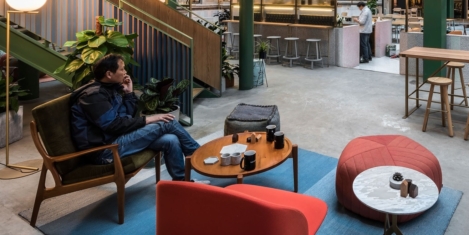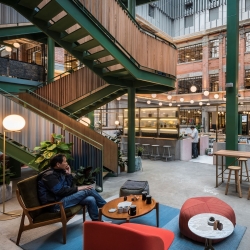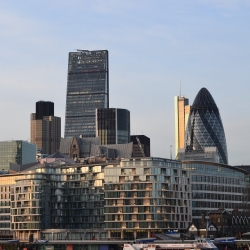To provide the best experiences, we use technologies like cookies to store and/or access device information. Consenting to these technologies will allow us to process data such as browsing behaviour or unique IDs on this site. Not consenting or withdrawing consent, may adversely affect certain features and functions.
The technical storage or access is strictly necessary for the legitimate purpose of enabling the use of a specific service explicitly requested by the subscriber or user, or for the sole purpose of carrying out the transmission of a communication over an electronic communications network.
The technical storage or access is necessary for the legitimate purpose of storing preferences that are not requested by the subscriber or user.
The technical storage or access that is used exclusively for statistical purposes.
The technical storage or access that is used exclusively for anonymous statistical purposes. Without a subpoena, voluntary compliance on the part of your Internet Service Provider, or additional records from a third party, information stored or retrieved for this purpose alone cannot usually be used to identify you.
The technical storage or access is required to create user profiles to send advertising, or to track the user on a website or across several websites for similar marketing purposes.
 New World Health Organization (WHO) Global Air Quality Guidelines (AQGs) claim to provide clear evidence of the damage air pollution inflicts on human health, at even lower concentrations than previously understood. The guidelines recommend new air quality levels to protect the health of populations, by reducing levels of key air pollutants, some of which also contribute to climate change. (more…)
New World Health Organization (WHO) Global Air Quality Guidelines (AQGs) claim to provide clear evidence of the damage air pollution inflicts on human health, at even lower concentrations than previously understood. The guidelines recommend new air quality levels to protect the health of populations, by reducing levels of key air pollutants, some of which also contribute to climate change. (more…)







 Since offices reopened, there has naturally been a much greater focus on health and safety. Office managers everywhere have deployed one-way corridors, anti-viral disinfectant wipes, and daily temperature checks in order to ensure that those who have returned to the office feel safe. Globally, businesses have learned to cope with these adverse circumstances, but there are other lessons from the past year that we should use to refresh the workplace as well.
Since offices reopened, there has naturally been a much greater focus on health and safety. Office managers everywhere have deployed one-way corridors, anti-viral disinfectant wipes, and daily temperature checks in order to ensure that those who have returned to the office feel safe. Globally, businesses have learned to cope with these adverse circumstances, but there are other lessons from the past year that we should use to refresh the workplace as well. 
 Huge changes in the world of work over the past 30 years have led to people having a greater attachment to their work, but also rising levels of stress and falling levels of control, which has coincided with low earners losing their ‘job satisfaction premium’ over higher paid colleagues, according to new research from think tank the
Huge changes in the world of work over the past 30 years have led to people having a greater attachment to their work, but also rising levels of stress and falling levels of control, which has coincided with low earners losing their ‘job satisfaction premium’ over higher paid colleagues, according to new research from think tank the 
 New research into workplace discrimination, commissioned by
New research into workplace discrimination, commissioned by 
 I recently stumbled upon the phrase epistemic trespass, which describes the phenomenon of people making judgements in fields in which they have no expertise. I came across it as it was used to explain the sudden explosion of opinions about Afghanistan from a hitherto unknown horde of experts. Which may or may not be the same horde that has been so very certain about immunology and public health during the pandemic. It’s an old idea and one that needs to be treated with care, for reasons set out by Noah Smith
I recently stumbled upon the phrase epistemic trespass, which describes the phenomenon of people making judgements in fields in which they have no expertise. I came across it as it was used to explain the sudden explosion of opinions about Afghanistan from a hitherto unknown horde of experts. Which may or may not be the same horde that has been so very certain about immunology and public health during the pandemic. It’s an old idea and one that needs to be treated with care, for reasons set out by Noah Smith 
 Disruption, cost, building style, individual goals, responsibility and shared space are cited as the key sustainability challenges for the flexible office sector, according to the
Disruption, cost, building style, individual goals, responsibility and shared space are cited as the key sustainability challenges for the flexible office sector, according to the 
 Are you considering a change in career paths? One sector that you may wish to strongly consider is the security industry. Whether a retail store, office block, or nightlife venue, most businesses will usually require security personnel. Therefore, this is an industry where there is always demand for new staff. Working in security careers can be thrilling, challenging and rewarding. There should be no doubting the fact that every day offers something completely different. Choosing a job that suits you is no simple decision with several different security career paths that you can go down.
Are you considering a change in career paths? One sector that you may wish to strongly consider is the security industry. Whether a retail store, office block, or nightlife venue, most businesses will usually require security personnel. Therefore, this is an industry where there is always demand for new staff. Working in security careers can be thrilling, challenging and rewarding. There should be no doubting the fact that every day offers something completely different. Choosing a job that suits you is no simple decision with several different security career paths that you can go down.
 While society has become more aware of psychological abuse in intimate or family relationships, psychological abuse in the workplace is more common and complex than we think, according to new research from
While society has become more aware of psychological abuse in intimate or family relationships, psychological abuse in the workplace is more common and complex than we think, according to new research from 
 WeWork, arguably the world’s most talked-about flexible space providers, and Cushman & Wakefield, the global real estate services firm, have announced they have entered into an exclusive strategic partnership to market both landlords and businesses on WeWork’s management experience platform and on several new jointly developed ideas aligned with the new appetite for flexible working.
WeWork, arguably the world’s most talked-about flexible space providers, and Cushman & Wakefield, the global real estate services firm, have announced they have entered into an exclusive strategic partnership to market both landlords and businesses on WeWork’s management experience platform and on several new jointly developed ideas aligned with the new appetite for flexible working. 
 There was a spring in the step of the central London office market in Q2 2021 with more businesses committing to new office space, as plans to return to workplaces took shape. Research by
There was a spring in the step of the central London office market in Q2 2021 with more businesses committing to new office space, as plans to return to workplaces took shape. Research by 
 The removal of most Covid restrictions in the UK has increased calls for clearer practical guidance and the setting of specific indoor air quality (IAQ) contaminant targets to support the health and wellbeing of building occupants. The Building Engineering Services Association (BESA) has, therefore, produced a concise guide to good practice:
The removal of most Covid restrictions in the UK has increased calls for clearer practical guidance and the setting of specific indoor air quality (IAQ) contaminant targets to support the health and wellbeing of building occupants. The Building Engineering Services Association (BESA) has, therefore, produced a concise guide to good practice: 








September 28, 2021
Developing a future of work strategy depends on asking the right questions
by Mark Caskey • Comment, Flexible working, Workplace design